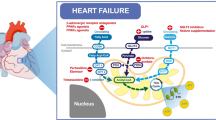Abstract
This review focuses on the regulation of myocardial fatty acids and glucose metabolism is physiological and pathological conditions, and the role of L-carnitine and of its derivative, propionyl-L-carnitine.
Fatty acids are the major oxidation fuel for the heart, while glucose and lactate provide the remaining need. Fatty acids in cytoplasm are transformed to long-chain acyl-CoA and transferred into the mitochondrial matrix by the action of three carnitine dependent enzymes to produce acetyl-CoA through the β-oxidaton pathway. Another source of mitochondrial acetyl-CoA is from the oxidation of carbohydrates. The pyruvate dehydrogenase (PDH) complex, the key irreversible rate limiting step in carbohydrate oxidation, is modulated by the intra-mitochondrial ratio acetyl-CoA/CoA. An increased ratio results in the inhibition of PDH activity. A decreased ratio can relieve the inhibition of PDH as shown by the transfer of acetyl groups from acetyl-CoA to carnitine, forming acetylcarnitine, a reaction catalyzed by carnitine acetyl-transferase. This activity of L-carnitine in the modulation of the intramitochondrial acety-CoA/CoA ratio affects glucose oxidation.
Myocardial substrate metabolism during ischemia is dependent upon the severity of ischemia. A very severe reduction of blood flow causes a decrease of substrate flux through PDH. When perfusion is only partially reduced there is an increase in the rate of glycolysis and a switch from lactate uptake to lactate production. Tissue levels of acyl-CoA and long-chain acylcarnitine increase with important functional consequences on cell membranes. During reperfusion fatty acids oxidation quickly recovers as the prevailing source of energy, while pyruvate oxidation is inhibited.
A considerable body of experimental evidence suggests that L-carnitine exert a protective effect in in vitro and in vivo models of heart ischemia and hypertrophy. Clinical trials confirm these beneficial effects although controversial results are observed. The actions of L-carnitine and propionyl-L-carnitine cannot be explained as exclusively dependent on the stimulation of fatty acid oxidation but rather on a marked increase in glucose oxidation, via a relief of PDH inhibition caused by the elevated acetyl-CoA/CoA ratio. Enhanced pyruvate flux through PDH is beneficial for the cardial cells since less pyruvate is converted to lactate, a metabolic step resulting in the acidification of the intracellular compartment. In addition, L-carnitine decreases tissue levels of acyl moieties, a mechanism particularly important in the ischemic phase.
Similar content being viewed by others
Author information
Authors and Affiliations
Additional information
Received: 25 January 1999, Returned for 1. revision: 18 February 1999, 1. Revision received: 10 May 1999, Returned for 2. revision: 7 June 1999, 2. Revision received: 21 December 1999, Accepted: 21 December 1999
Rights and permissions
About this article
Cite this article
Calvani, M., Reda, E. & Arrigoni-Martelli, E. Regulation by carnitine of myocardial fatty acid and carbohydrate metabolism under normal and pathological conditions. Basic Res Cardiol 95, 75–83 (2000). https://doi.org/10.1007/s003950050167
Issue Date:
DOI: https://doi.org/10.1007/s003950050167




